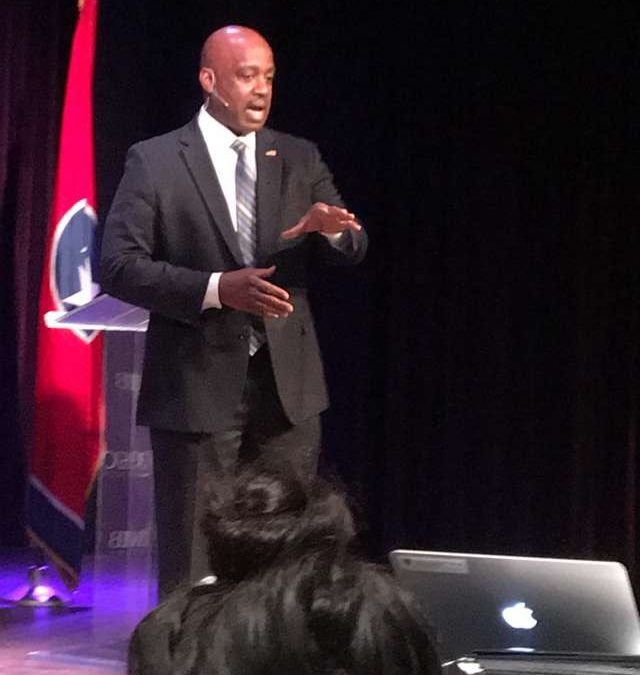Lipscomb hosted “Conversations of Significance,” featuring guest speaker Captain Ronald S. Johnson, to discuss what communities and individuals can do during crisis situations.
The event was put on in an effort to ease tensions between the Nashville law enforcement and community members and facilitate conversation following the Nashville shooting death of Jocques Clemmons, a 31-year old African American man.
Johnson was a captain with the Missouri Highway Patrol and was named commander of Ferguson operations on August 14, 2014, after the shooting of unarmed Michael Brown in Ferguson. Missouri. He was named as one of CNN’s Extraordinary people of 2014.
At times, Johnson said he felt he could not do the job required of him, yet he consistently relied on his belief in God to stay strong.
“Leadership is not about luck, it’s about faith,” Johnson said.
The shooting of Brown occurred on August 9, 2014, in Ferguson, Missouri, a northern suburb of St. Louis. Brown, an 18-year-old African-American man, was fatally shot after robbing a convenience store by Darren Wilson, 28, a Caucasian Ferguson police officer.
On the first day of Johnson’s command, he marched with protesters down West Florissant Avenue — an effort that eased tensions among protestors, and what many hoped indicated an improving relationship between law enforcement and the Ferguson community.
Johnson said that he was unaware at first that he would be placed in such a position, but he was both humbled and overwhelmed to the point where he would often be brought to tears when watching his city erupt in chaos and violence.
In a November interview with Esquire, Johnson admitted that his days as commander were intense and stressful.
“I’m just trying to be that wall in the middle of the road for now,” Johnson said, adding, “so that when I step away, everybody can reach over, embrace each other and connect.”
The unrest in Ferguson led to a national discussion about how young men of color are treated by the criminal justice system.
“Black lives do matter,” Johnson stated. “But if I could put a message on a T-shirt, it would say that different lives matter. Muslim lives matter. LGBT lives matter. It’s not so much as a black and white issue . . . as an issue of humanity.”
Steve Joiner, Dean of Lipscomb’s College of Leadership and Public Service, moderated the discussion, which included questions and answers from the audience.
Audience members at the Lipscomb event included several prominent Nashville Pastors and Civic leaders, including Juvenile Court Judge Sheila Calloway and Metro Councilman Russ Pulley.
Pulley commended Johnson on his work in the community.
“When you are motivated by the need to do the right thing, not for special interest, or accolades, but because you want to do what is right, you will then be successful,” Pulley said.
Although Johnson said that he has no political aspirations in his future, he plans to write a book about his experiences that he hopes will help and empower other leaders in crisis. Johnson said that he was impressed with Lipscomb and would resolve to feature the school in his book.
“When I leave here, I want to leave with more than I have given,” he said.
For more information on these events, visit Conversations of Significance.
Johnson left the audience with some advice in the wake of the recent shooting.
“Reach out to each other, have the difficult conversations and look at the bigger picture: how we are more alike, versus focusing on our differences.”

